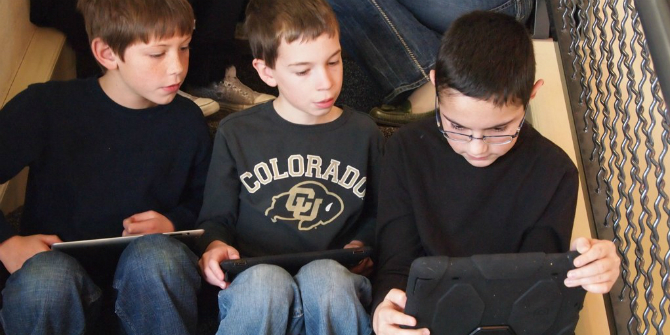
 While children’s reading experience is being transformed with digital reading formats, personalised and interactive books allowing for more personalisation, there are risks around the data this releases. Natalia Kucirkova and Rosie Flewitt identify four main areas of concern and call for regulation. Natalia is Senior Research Associate, and Rosie is Reader in Early Communication and Learning, both at University College London, Institute of Education. This post is republished from the LSE blog.
While children’s reading experience is being transformed with digital reading formats, personalised and interactive books allowing for more personalisation, there are risks around the data this releases. Natalia Kucirkova and Rosie Flewitt identify four main areas of concern and call for regulation. Natalia is Senior Research Associate, and Rosie is Reader in Early Communication and Learning, both at University College London, Institute of Education. This post is republished from the LSE blog.
Digital reading formats mean a child’s reading experience can be ‘personalised’ at many levels. Their name can be added into a popular fairy tale, or they can even add their own drawings to a story, make their own voice-overs or replace the main characters’ names with their own (e.g. Mr Glue Stories). Personalised books are now available as interactive digital books downloadable on touchscreens (e.g. Put Me In The Story®) as well as classic printed books (e.g. Lost My Name). This can make reading more enjoyable for young children, and the personalised data that is generated can be used to create adaptive algorithms to match texts to each child’s reading level, language scores or genre preferences (see the iRead project).
Key concerns
On 16 March 2017 we hosted a meeting with some of the UK’s key players in the children’s app and print publishing industry, international researchers and representatives from Book Trust and National Literacy Trust… Read the full post here
[Header image credit: B. Flickinger, CC BY 2.0_08] Photo licensed under a Creative Commons Attribution-NonCommercial-NoDerivs 3.0 Unported License
 Close
Close



 While children’s reading experience is being transformed with digital reading formats, personalised and interactive books allowing for more personalisation, there are risks around the data this releases. Natalia Kucirkova and Rosie Flewitt identify four main areas of concern and call for regulation.
While children’s reading experience is being transformed with digital reading formats, personalised and interactive books allowing for more personalisation, there are risks around the data this releases. Natalia Kucirkova and Rosie Flewitt identify four main areas of concern and call for regulation. 